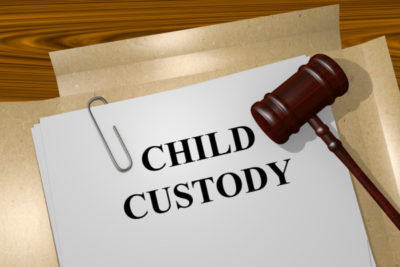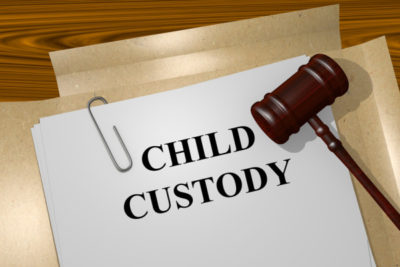Aug 2024
25th Aug 2024
Pet Custody in California: What Does the Law Say in 2025?
 The concept of pet custody in California family law has evolved over time. Recent changes have added much more nuance and complexity to pet parents that are getting divorced and feuding over who gets to take the pets with them. After all, people love their pets and often regard them as core members of the family unit. It’s not too surprising to see folks get into heated arguments and even propose shared pet custody arrangements.
The concept of pet custody in California family law has evolved over time. Recent changes have added much more nuance and complexity to pet parents that are getting divorced and feuding over who gets to take the pets with them. After all, people love their pets and often regard them as core members of the family unit. It’s not too surprising to see folks get into heated arguments and even propose shared pet custody arrangements. 15th Aug 2024
What If My Spouse Doesn’t Want to Get a Divorce?
 For most folks on the brink of divorce, the decision is not one that they make lightly, and is often the result of months of thinking and planning. However, the other party might not be quite so prepared once the news hits them. In some cases, your spouse may downright fight the idea and may do everything in his or her power to stop you from getting divorced.
For most folks on the brink of divorce, the decision is not one that they make lightly, and is often the result of months of thinking and planning. However, the other party might not be quite so prepared once the news hits them. In some cases, your spouse may downright fight the idea and may do everything in his or her power to stop you from getting divorced.10th Aug 2024
Can an Arrest Impact My Child Custody Rights in CA
 When it comes to custody arrangements after a divorce, the family law courts will usually try to work with both parents to try and find a plan that works for all involved parties. If disputes arise, the courts may step in to create an arrangement that best fits the interests of the child. Generally, the goal is to ensure that the child is able to spend time with both parents as circumstances allow.
When it comes to custody arrangements after a divorce, the family law courts will usually try to work with both parents to try and find a plan that works for all involved parties. If disputes arise, the courts may step in to create an arrangement that best fits the interests of the child. Generally, the goal is to ensure that the child is able to spend time with both parents as circumstances allow. 5th Aug 2024
Key Factors that Are Used to Calculate Spousal Support in CA
 When a marriage comes to an end, a number of important terms need to be finalized before a couple can walk away from each other for good. One of these is alimony, which determines the amount (if any) that a spouse needs to pay the other person, as well as the duration that these payments will last.
When a marriage comes to an end, a number of important terms need to be finalized before a couple can walk away from each other for good. One of these is alimony, which determines the amount (if any) that a spouse needs to pay the other person, as well as the duration that these payments will last. Jul 2024
25th Jul 2024
Why is My CA Divorce So Slow? Tips to Expedite Things
 Divorce is never easy. It’s a highly emotionally challenging event, involves a lot of rapid life changes, and it can quickly spiral out of control in terms of costs and time spent. This can feel highly demoralizing, and there can be frustrating periods of complete radio silence from the courts or the other party.
Divorce is never easy. It’s a highly emotionally challenging event, involves a lot of rapid life changes, and it can quickly spiral out of control in terms of costs and time spent. This can feel highly demoralizing, and there can be frustrating periods of complete radio silence from the courts or the other party. 15th Jul 2024
Deferred Compensation and Divorce: How Does it Work in CA?
 As we’ve discussed before, CA is a community property state. In short, this means that if a married couple gets divorced, everything they accrued, including all assets, valuables, and money, is split equally and fairly between both parties.
As we’ve discussed before, CA is a community property state. In short, this means that if a married couple gets divorced, everything they accrued, including all assets, valuables, and money, is split equally and fairly between both parties. 10th Jul 2024
Is the Ex Playing Unfair? Dirty Divorce Tactics To Look Out For
 At the White Oak Law, we’ve dealt with thousands of unique divorces and family law cases, each with their own intricacies. Over this time, we’ve seen it all, from amicable divorces to hostile and contentious proceedings that are drawn out for months.
At the White Oak Law, we’ve dealt with thousands of unique divorces and family law cases, each with their own intricacies. Over this time, we’ve seen it all, from amicable divorces to hostile and contentious proceedings that are drawn out for months. 5th Jul 2024
How CA Restraining Orders Can Help Protect You
 Are you dealing with abuse or harm from a partner, soon-to-be-ex, or any other party involved in your CA family law dispute? Whatever form the abuse may take, from intimidation to harassment or even physical or sexual abuse, you deserve safety and protection from said actions. The family law courts can provide legally-binding restrictions on guilty parties and you have the right to request this via a restraining order.
Are you dealing with abuse or harm from a partner, soon-to-be-ex, or any other party involved in your CA family law dispute? Whatever form the abuse may take, from intimidation to harassment or even physical or sexual abuse, you deserve safety and protection from said actions. The family law courts can provide legally-binding restrictions on guilty parties and you have the right to request this via a restraining order.Jun 2024
23rd Jun 2024
An Updated Look At California Divorce Statistics in 2024
 During and briefly after the pandemic, California and other states experienced increased rates of divorce. Now, looking back a few years later, what does the landscape look like? Recent divorce statistics for the state were published earlier this year, and the results show interesting, changing trends.
During and briefly after the pandemic, California and other states experienced increased rates of divorce. Now, looking back a few years later, what does the landscape look like? Recent divorce statistics for the state were published earlier this year, and the results show interesting, changing trends. 15th Jun 2024
Red Flags to Look Out For When Shopping for a CA Divorce Attorney
 There are a lot of factors that are likely to impact your divorce outcome in CA. Some of these are not always under your control, but one of the biggest factors that is under your control is the specific attorney or legal counsel that you choose to represent you in your case.
There are a lot of factors that are likely to impact your divorce outcome in CA. Some of these are not always under your control, but one of the biggest factors that is under your control is the specific attorney or legal counsel that you choose to represent you in your case. 10th Jun 2024
Social Media and Divorce Proceedings in 2024
 Year after year, social media continues to play a major role in every day affairs. With the rise of giants such as Facebook, Twitter, Instagram and YouTube, along with newcomers such as TikTok, it seems like everyone is saying their piece on social media nowadays.
Year after year, social media continues to play a major role in every day affairs. With the rise of giants such as Facebook, Twitter, Instagram and YouTube, along with newcomers such as TikTok, it seems like everyone is saying their piece on social media nowadays. 4th Jun 2024
The Potential Effects of Divorce on Your Mental Health
 A divorce can shake your reality and sense of stability to its core. In addition to the emotional and financial distress that comes with such a major life event, there are many ways that a divorce can impact your overall mental health. After all, you’re losing a shared life with a partner that you planned to spend the rest of your life with. This can be emotionally devastating to anyone, even if you initiated the divorce on your end.
A divorce can shake your reality and sense of stability to its core. In addition to the emotional and financial distress that comes with such a major life event, there are many ways that a divorce can impact your overall mental health. After all, you’re losing a shared life with a partner that you planned to spend the rest of your life with. This can be emotionally devastating to anyone, even if you initiated the divorce on your end. May 2024
25th May 2024
Accepting the End of Your Marriage and Moving Forward
 Nobody gets married with the intention of getting a divorce, and it can be devastating to think about the end of something that you truly expected would last a lifetime. Unfortunately, we can’t always control when things or other people change, and perhaps your relationship no longer feels the same. Either you or your partner are more distant, there’s more arguing and contempt, or perhaps they have engaged in behaviors that push your boundaries or are disrespectful in nature.
Nobody gets married with the intention of getting a divorce, and it can be devastating to think about the end of something that you truly expected would last a lifetime. Unfortunately, we can’t always control when things or other people change, and perhaps your relationship no longer feels the same. Either you or your partner are more distant, there’s more arguing and contempt, or perhaps they have engaged in behaviors that push your boundaries or are disrespectful in nature. 15th May 2024
Getting Married Again: Challenges You May Face as a Remarried Couple
 After a divorce, it’s only natural for folks to want to jump back into the dating pool once they feel up for it. Even less surprising, it’s not uncommon for divorced individuals to remarry and give the idea of ever-lasting love another chance.
After a divorce, it’s only natural for folks to want to jump back into the dating pool once they feel up for it. Even less surprising, it’s not uncommon for divorced individuals to remarry and give the idea of ever-lasting love another chance. 10th May 2024
Confronting a Cheater: How to Best Prep for Your CA Divorce
 Finding out that your spouse or partner is cheating on you can be devastating. The severity of the betrayal at the hands of your partner can be highly traumatic. Unfortunately, finding out about any infidelity is just the beginning of a long process for many who are looking to leave their unfaithful spouse.
Finding out that your spouse or partner is cheating on you can be devastating. The severity of the betrayal at the hands of your partner can be highly traumatic. Unfortunately, finding out about any infidelity is just the beginning of a long process for many who are looking to leave their unfaithful spouse. 4th May 2024
Poligamy, Polyamory and Bigamy in CA Family Law
 Generally, most marriages in the U. S. are monogamous and traditionally people are expected to be faithful to their spouse for the long run. This tradition is embedded into the legal system in many states, where cheating on your spouse can actually carry legal ramifications.
Generally, most marriages in the U. S. are monogamous and traditionally people are expected to be faithful to their spouse for the long run. This tradition is embedded into the legal system in many states, where cheating on your spouse can actually carry legal ramifications. Apr 2024
25th Apr 2024
CA Divorce Rates in 2024: The Connection Between Debt and Divorce
 For most couples, divorce is a complicated situation that involves a multitude of factors. However, there are often primary or core issues that serve as the root cause of a given divorce. Research into this area generally tries to pinpoint the main causes of divorce year after year, with certain issues maintaining center stage such as infidelity and financial duress.
For most couples, divorce is a complicated situation that involves a multitude of factors. However, there are often primary or core issues that serve as the root cause of a given divorce. Research into this area generally tries to pinpoint the main causes of divorce year after year, with certain issues maintaining center stage such as infidelity and financial duress. 15th Apr 2024
Arguing Against a Modification of Child Custody in CA
 An unexpected request to modify an existing child support order can quickly turn your world upside down. Potentially losing time with your child and having to rearrange your life to match the new custody order can be harrowing ordeals. Even when you expect the request ahead of time, it can still be incredibly difficult to navigate the potential complications and changes to your life.
An unexpected request to modify an existing child support order can quickly turn your world upside down. Potentially losing time with your child and having to rearrange your life to match the new custody order can be harrowing ordeals. Even when you expect the request ahead of time, it can still be incredibly difficult to navigate the potential complications and changes to your life. 10th Apr 2024
Confronting a Cheater: How to Best Prep for Your CA Divorce
 Finding out that your spouse or partner is cheating on you can be devastating. The severity of the betrayal at the hands of your partner can be highly traumatic. Unfortunately, finding out about any infidelity is just the beginning of a long process for many who are looking to leave their unfaithful spouse.
Finding out that your spouse or partner is cheating on you can be devastating. The severity of the betrayal at the hands of your partner can be highly traumatic. Unfortunately, finding out about any infidelity is just the beginning of a long process for many who are looking to leave their unfaithful spouse. 10th Apr 2024
No-Fault Divorce in CA: Do I Still Need To Collect Evidence?
 California, along with 11 other states, is known as a “no-fault” divorce state. This means that neither spouse needs a reason, or for the other person to be at “fault,” in order to get a divorce. This provides a greater level of flexibility for married couples who are looking to get a divorce, but can also lead to significant misconceptions.
California, along with 11 other states, is known as a “no-fault” divorce state. This means that neither spouse needs a reason, or for the other person to be at “fault,” in order to get a divorce. This provides a greater level of flexibility for married couples who are looking to get a divorce, but can also lead to significant misconceptions. 4th Apr 2024
Who Keeps Rental Properties in a CA Divorce?
 Investing in real estate has always been a hot commodity. Owning one or more properties can provide families with increased financial security, diversification of assets, and as a source of direct income in the case of many rental units. Millions of properties around CA and the country are managed by small, local investors rather than large conglomerates.
Investing in real estate has always been a hot commodity. Owning one or more properties can provide families with increased financial security, diversification of assets, and as a source of direct income in the case of many rental units. Millions of properties around CA and the country are managed by small, local investors rather than large conglomerates. Mar 2024
25th Mar 2024
What Are the Steps for Obtaining a Confidential Marriage License in CA?
 For some couples looking to get married, privacy is of utmost importance. It’s common knowledge that marriages are public information, which might give these couples pause as they plan to tie the knot. For these cases, there’s actually an option available that can help folks preserve their privacy and confidentiality. This is known as a confidential marriage license.
For some couples looking to get married, privacy is of utmost importance. It’s common knowledge that marriages are public information, which might give these couples pause as they plan to tie the knot. For these cases, there’s actually an option available that can help folks preserve their privacy and confidentiality. This is known as a confidential marriage license. 15th Mar 2024
Nurturing Your Self Confidence After Your Divorce
 Discussions involving divorce often focus on the legal and financial challenges that a separating couple might expect to face. Likewise, much of a person’s mind might be focused on custody issues or other family law disputes, and for good reason. However, it’s also important to focus on your mental and emotional well-being.
Discussions involving divorce often focus on the legal and financial challenges that a separating couple might expect to face. Likewise, much of a person’s mind might be focused on custody issues or other family law disputes, and for good reason. However, it’s also important to focus on your mental and emotional well-being. 10th Mar 2024
Child Custody Disputes When a Parent Passes Away
 Losing a parent is a devastating event for a child, who may feel as if their entire world has been shattered. In addition to the difficult emotional hurdles that come with this type of loss, there can be numerous legal and logistical challenges as well.
Losing a parent is a devastating event for a child, who may feel as if their entire world has been shattered. In addition to the difficult emotional hurdles that come with this type of loss, there can be numerous legal and logistical challenges as well. 